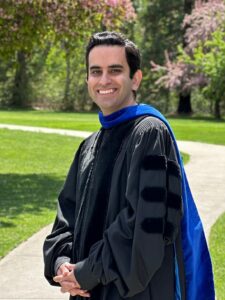
Join us in congratulating Dr. Ahmad Hojatimalekshah (Computing PhD, Spring 2023) who recently received Boise State Graduate College’s Distinguished Doctoral Scholarship Award. We feel fortunate to have served Ahmad during his time in our doctoral program. He is an exceptional human being with a very bright future, and we are so very proud of all that he has–and will–accomplish.
We asked Dr. Hojatimalekshah to reflect on this honor and his experience in the Computing PhD program.
Computing PhD: How does it feel to receive this award?
Hojatimalekshah: I am deeply honored and genuinely thrilled to receive the Distinguished Doctoral Scholarship Award. This award holds special meaning for me, as it underscores the invaluable support and guidance I have received from my advisor, Dr. Nancy Glenn, my dedicated committee members, and the entire Computing doctoral program at Boise State University.
Computing PhD: Reflecting on your time in the Computing doctoral program, which aspects were most beneficial or meaningful to you?
Hojatimalekshah: At the program’s commencement, I embarked on a set of foundational courses that covered essential topics in computing. These courses provided a strong theoretical grounding and introduced core concepts that serve as the basis for advanced research. In addition, the program’s emphasis on interdisciplinary collaboration has allowed me to work on projects that bridge multiple disciplines, enhancing my ability to tackle complex real-world problems. These experiences equipped me to engage in cutting-edge research projects like SnowEx and provided me with the opportunity to explore and contribute to the advancement of knowledge in my field.
Computing PhD: What projects are you currently working on?
Hojatimalekshah: I am currently involved in a project focused on the development of predictive machine learning models. These models are designed for snow density estimation, utilizing both L-band and C-band radar data, which incorporate diverse polarizations. The primary aim of this project is to enhance the accuracy of snow water equivalent estimation, particularly for applications in water resource management.
Computing PhD: What future goals are you hoping to achieve?
Hojatimalekshah: In the near future, my primary goal is to advance my expertise in the field of remote sensing and machine learning further. I hope to apply this knowledge to address critical environmental challenges, particularly in the realm of snowpack monitoring and water resource management. Additionally, I aspire to collaborate with interdisciplinary teams and contribute to research efforts that can have a meaningful and positive impact on our understanding of snow-related processes and their implications for ecosystems and society.
Computing PhD: If you could give current Computing PhD students helpful or motivating advice, what would it be?
Hojatimalekshah: Define your research goals and objectives early in your program. Having a clear sense of purpose will help you stay focused and motivated throughout your doctoral studies. Equally crucial is effective time management. Create a realistic schedule, set priorities, and allocate dedicated time for research, coursework, and personal life. In addition, foster relationships with your advisors, mentors, and peers. Effective communication and collaboration are key to success in academia and research. Finally, actively expand your network, both within and beyond your university’s boundaries. Collaborations and connections can open up new research opportunities and enrich your academic perspective.